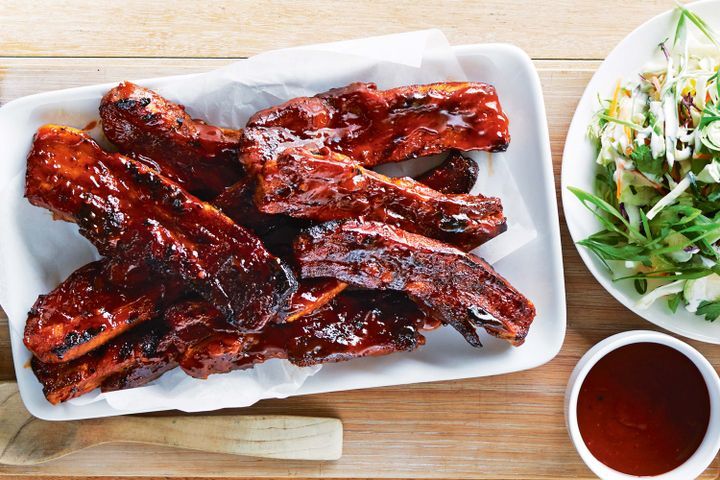Pork spare ribs are a beloved dish enjoyed across many cuisines for their rich flavor, satisfying texture, and versatility in cooking methods. Whether slow-cooked, oven-baked, grilled, or smoked, spare ribs offer a delicious meal when prepared properly. With the right seasoning and cooking technique, you can transform this humble cut of meat into a mouth-watering centerpiece that’s perfect for casual dinners, weekend barbecues, or special occasions.
What Are Pork Spare Ribs?
Pork spare ribs are cut from the belly side of the pig, near the breastbone and below the baby back ribs. They are larger, meatier, and contain more fat compared to baby back ribs. This extra fat makes them ideal for slow cooking, as it renders down over time, making the meat tender, juicy, and flavorful. Spare ribs typically include a good amount of bone and connective tissue, which contributes to their deep taste when cooked low and slow.
Preparing Pork Spare Ribs
Before cooking, it’s essential to prepare your ribs properly. Start by removing the silver skin (a tough membrane on the bone side of the ribs). Use a small knife to loosen the membrane at one end, then grab it with a paper towel and pull it off in one piece. This allows flavors to penetrate better and improves texture.
Next, season your ribs. You can go for a simple salt-and-pepper combo or use a more complex dry rub with ingredients like brown sugar, paprika, garlic powder, onion powder, cayenne, and mustard powder. Let the ribs rest for at least 30 minutes after seasoning—or refrigerate them overnight for a deeper flavor.
Cooking Methods
1. Oven-Baked Pork Spare Ribs
One of the easiest and most popular methods is baking the ribs in the oven. Wrap the seasoned ribs in foil and place them on a baking sheet. Bake at 150–160°C (300–325°F) for 2.5 to 3 hours. The foil helps trap moisture, slowly breaking down the connective tissue. Once tender, unwrap the ribs, brush them with your favorite barbecue sauce, and broil or bake for another 10–15 minutes to caramelize the surface.
2. Slow Cooker Spare Ribs
Using a slow cooker is a convenient way to ensure fall-off-the-bone ribs with minimal effort. After searing the ribs (optional for extra flavor), place them in the slow cooker with barbecue sauce, garlic, onions, and a splash of apple cider vinegar or cola. Cook on low for 7–8 hours. Once done, you can finish them under a grill or broiler to get that slightly crispy, caramelized top.
3. Grilled Pork Spare Ribs
For a more smoky and charred flavor, grilling is the way to go. Cook the ribs over indirect heat on a barbecue grill for about 2–3 hours, covered, until tender. In the last 15 minutes, brush with barbecue sauce and place over direct heat to get a slightly charred, sticky glaze.
4. Smoked Spare Ribs
For those with a smoker, spare ribs are ideal. Season the ribs and smoke them at around 110–120°C (225–250°F) for 5–6 hours using woods like hickory, apple, or cherry. Use the 3-2-1 method: 3 hours uncovered smoke, 2 hours wrapped in foil, and 1 final hour unwrapped with sauce. This method ensures juicy meat with a deep smoky flavor.
Tips for Perfect Spare Ribs
- Low and slow is key: Avoid high heat, which can dry out the ribs. Gentle, long cooking breaks down the connective tissues.
- Moisture matters: Wrapping in foil or covering helps retain moisture during baking or smoking.
- Let them rest: After cooking, allow the ribs to rest for 10–15 minutes before slicing to retain juices.
- Cut between the bones: Use a sharp knife and find the space between bones for clean, even cuts.
Sauce or No Sauce?
Barbecue sauce adds a sticky, tangy, and often sweet glaze that enhances ribs, but it’s optional. Dry-rubbed ribs can be just as delicious on their own. If you use sauce, apply it toward the end of cooking to prevent burning due to the sugar content.
Conclusion
Pork spare ribs are a celebration of bold flavor, tender meat, and comforting satisfaction. Whether slow-cooked in a crockpot, roasted in the oven, grilled to perfection, or smoked with care, they adapt well to a range of tastes and occasions. With a little preparation and patience, spare ribs can be the star of any meal, delivering a hearty and delicious experience every time.
